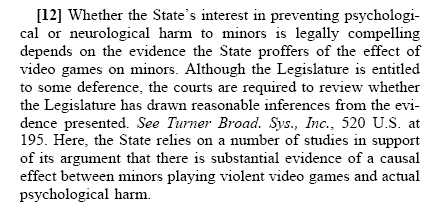In Video Software v. Schwarzenegger, the U.S. Court of Appeals for the Ninth Circuit tears several studies to shreds:

In Video Software v. Schwarzenegger, the U.S. Court of Appeals for the Ninth Circuit tears several studies to shreds:

Do you need to analyze statistics? Want to analyze data for free? Thinking about how to visualize data? How about generating “word clouds” from text you provide? (I’m looking at you, qualitative researchers…)
Digital Research Tools (DiRT) is a wiki that “collects information about tools and resources that can help scholars (particularly in the humanities and social sciences) conduct research more efficiently or creatively,” including online tools for organizing research, data collection, transcription, note-taking, blogging and a lot more.
update: The BBC reports on October 14, 2008:
Areas activated by reading a book in the brain of an experienced web user:

Web use stimulates much more activity in the same brain:
Brain activity in web newcomers: similar for reading and internet use:
Via the Associated Press on September 16, 2008, it appears to be a matter of when, not if video games become incorporated into the school environment:
Ninety-seven percent of young respondents play video games. That’s 99 percent of boys and 94 percent of girls, with little difference in the percentages among various racial and ethnic groups and incomes.
… And they don’t just play by themselves. Nearly two-thirds play video games to socialize face-to-face with friends and family, while just over a quarter said they play with Internet friends.
“It shows that gamers are social people,” says Amanda Lenhart, a senior researcher at Pew who led the report on the survey. “They communicate just as much. They spend time face-to-face, just as much as other kids. They e-mail and text.”
It does seem that this upcoming generation is communicating loud and clear about their needs as learners. It appears that there is a strong desire for learning to be interactive and fun, as well as a social activity. This appears to be a huge opportunity for educators, especially in how a well-designed game can tailor a learning experience to the individual needs of a learner and allow them to progress to a new “level” at their own pace. A video game format also seems well-suited to identify areas where a student is having difficulty, and would allow an educator to have immediate access to this information.


You must be logged in to post a comment.